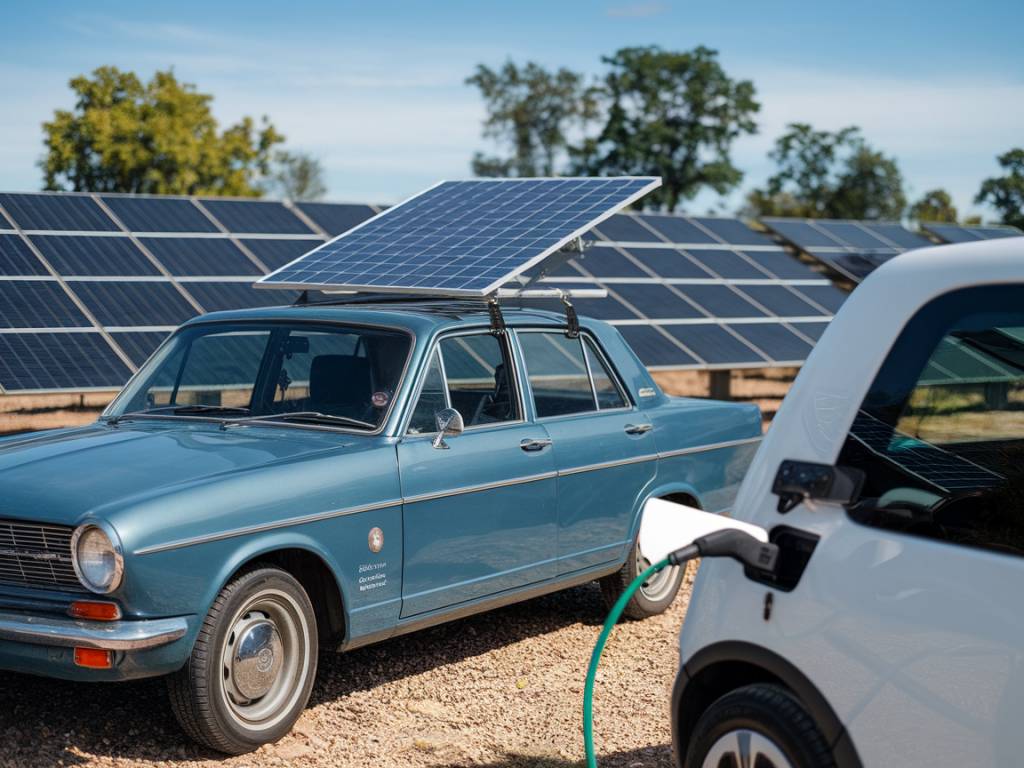Introduction to Solar Energy and Electric Vehicles
In recent years, the adoption of electric vehicles (EVs) has seen a significant rise, driven by concerns over climate change and the need for sustainable transportation. Solar energy, being one of the most abundant and eco-friendly sources of power, presents a compelling solution to charging these vehicles. This article delves into how solar energy can power electric vehicles, exploring the mechanisms involved, benefits, challenges, and future prospects.
Understanding Solar Energy
Solar energy is harnessed from the sun through photovoltaic (PV) cells, which convert sunlight directly into electricity. These PV cells are typically assembled into solar panels, which can be installed on rooftops, open fields, or integrated into various surfaces. The energy generated can be used immediately, stored in batteries, or fed back into the grid.
Key terms associated with solar energy include photovoltaic cells, solar panels, solar inverters, and solar batteries. Each component plays a crucial role in the conversion, storage, and utilization of solar power.
How Solar Energy Powers Electric Vehicles
Powering electric vehicles with solar energy involves several steps, from the generation of electricity via solar panels to the charging of the EV using this renewable power. Here’s a simplified breakdown of the process:
- Solar Panels: Solar panels collect sunlight and convert it into direct current (DC) electricity.
- Inverter: The DC electricity is then converted into alternating current (AC) by an inverter, making it suitable for household use or for charging electric vehicles.
- Electric Vehicle Charger: An EV charger, compatible with the vehicle, utilizes this AC electricity to charge the battery of the electric vehicle.
Benefits of Using Solar Energy for Charging EVs
Utilizing solar energy to power electric vehicles offers several notable advantages. Below are some of the key benefits:
- Environmental Impact: Solar energy is a clean, renewable power source that reduces the carbon footprint associated with conventional fossil fuels. Charging an EV with solar power further minimizes greenhouse gas emissions.
- Cost Savings: After the upfront investment in solar panels and associated equipment, the cost of generating electricity from solar becomes negligible. This leads to significant savings on electricity bills over time.
- Energy Independence: By generating their own electricity, EV owners can reduce reliance on the grid and fluctuating energy prices. This independence is particularly beneficial in areas with unstable power supply.
- Integration with Smart Grids: Solar energy systems can be integrated with smart grid technologies, allowing for optimized energy use, efficient distribution, and better load management.
Challenges in Using Solar Energy for EV Charging
While the prospects of solar-powered EVs are promising, several challenges need to be addressed to make this a widespread reality:
- Initial Costs: The upfront investment in solar panels, inverters, and battery storage systems can be high. However, various financing options and government incentives can mitigate these costs.
- Energy Storage: Solar energy is dependent on sunlight, which is not available 24/7. Effective energy storage solutions, such as advanced batteries, are crucial to store excess energy generated during sunny periods for use during nighttime or cloudy days.
- Space Requirements: Installing enough solar panels to generate sufficient electricity for EV charging may require significant space, which could be a limitation in urban areas.
- Efficiency Losses: Energy conversion processes, storage, and transmission can result in efficiency losses. Continuous advancements in technology are essential to minimize these losses.
Real-World Examples and Case Studies
Several real-world examples and case studies highlight the successful integration of solar energy with electric vehicle charging. For instance:
- Tesla Solar Roof: Tesla offers solar roof tiles that integrate seamlessly with home architecture, generating electricity to power homes and charge Tesla EVs.
- Envision Solar’s EV ARC: Envision Solar has developed a portable, solar-powered EV charging station called the EV ARC. It can be deployed quickly in various locations, offering on-demand solar-powered charging.
- Sonnen’s Solar + Storage Solutions: Sonnen provides solar energy systems paired with intelligent battery storage, allowing homeowners to store excess solar energy and use it for EV charging or other needs.
Future Trends and Innovations
As technology advances, several trends and innovations are shaping the future of solar-powered EV charging. Some of these include:
- Improved Solar Panel Efficiency: Advances in photovoltaic technology are continuously improving the efficiency of solar panels, enabling higher energy output from smaller surface areas.
- Integration with Vehicle-to-Grid (V2G) Technology: V2G technology allows electric vehicles to feed energy back into the grid. This bidirectional flow can help balance supply and demand and stabilize the grid.
- Wireless Charging: Research is being conducted on wireless charging technology that uses inductive charging pads, eliminating the need for physical plugs and cables.
- Expansion of Solar-Powered Charging Infrastructure: Governments and private companies are investing in expanding solar-powered EV charging infrastructure, making it more accessible to the public.
Conclusion
The synergy between solar energy and electric vehicles holds immense potential for creating a sustainable, eco-friendly transportation system. Despite some challenges, the benefits of using solar power to charge EVs are undeniable. With ongoing technological advancements and supportive policies, the future of solar-powered electric vehicles looks bright. By embracing this innovative approach, we can significantly reduce our environmental impact while enjoying the economic advantages of renewable energy.
